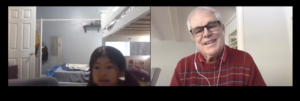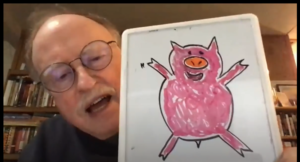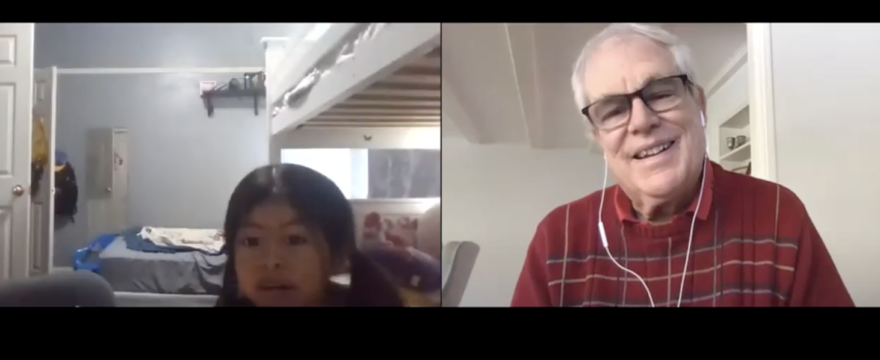The Incremental Value of 1:1 Time During a Pandemic
Oakland School Volunteers (OSV): Tell us more about the Piedmont Ave. Reading Tutors. What is the group’s purpose? What is special about the way that your group supports the Piedmont Avenue Elementary school community?
Jack: Our goal is to be as helpful to our students as teachers as possible – we see them as our constituency. Our goal is to help improve reading [outcomes] and to just [support students] to be the best students possible. I am just overwhelmed with admiration for what teachers do, even in regular years, to say nothing of what they’re doing this year. We all feel a sense of togetherness with our teachers and wanting to help them as much as we can. One thing we found we could be really effective at was working with teachers to identify which students could most use the tutoring help. So we learned how to do some reading assessments and evaluations to work with the teachers to identify the highest priority students.
Paul: Involving ourselves in the assessment process with reading, allowed us to align with each teacher’s real goals with their students. So we’re not only helping the teachers get a sense of where the students were in their progress towards grade level, but we’re also using the same tools to drive our program, which helped us align better to what the teachers were trying to accomplish. One of the great collegial aspects of the program is that we have quite a few former elementary school teachers who liked everything about teaching except the staff meetings (laughs).They’ve not only been enthusiastic participants but they also bring a lot of information and technique into the program.
Over time, we’ve developed the idea of a structured session: some word work, a guided reading, and perhaps a read aloud with a higher level book in which the tutor reads a higher level book to focus purely on comprehension and fluency. By educating the tutors in that structured session, we are getting people to a level of confidence and competency more quickly.
OSV: PART immediately sprung to action when schools closed because of the pandemic. You piloted virtual volunteer engagement with students over the summer. Why was it so important to your group to act so quickly?
Jack: I remember that Oakland School Volunteers sent out an email when schools closed asking volunteers to reach out to teachers, and I reached out to Ms. Haider and the two of us felt activated to make something happen. The Ed Fund, and Oakland School Volunteers especially, has been there as a support from the beginning..
We were all in great unknown and at that point. We had grown from 12 to 20 volunteers in our group. Everyone who we talked to do was interested in continuing – the mission was not complete.
We started working very directly with Oakland School Volunteers to try to figure out how to make [virtual volunteering] happen based on what was allowed for volunteers in OUSD. Oakland School Volunteers played a big role in helping us determine how to keep it moving through the summer in a more organized way. In turn, this helped us all figure out how to continue this as a model for year around. It has been a GREAT group effort! [Our school community now has] 51 actively tutored students working with 29 tutors, and we think we have the tutor capacity to think that can work with 60 students. We’re close to having as many virtual sessions as we were having live sessions when schools were open.
Paul: When the school closed in March, I thought, that’s probably it for this year. And the next day, Jack called and said, “So why don’t we figure out a way to do this?” And Jack is pretty persuasive. It was a no brainer to use Zoom, but then what could you do on Zoom?
Some of our tutors are very adept at technology and some aren’t- most people knew how to use computers as a tool to do the thing they already do with it. Doing something new is a challenge! So, we put together a training program: here’s how we use Zoom first and AND here’s how to use the appropriate educational content on Zoom. We realized 10 minutes into it that the first training session would not be enough. It would have to be followed up with 1:1 meetings with each tutor to practice. Each tutor would meet with me and we would go through Zoom and the content skills. Those first weeks were really tough. Folks really worked hard to learn how to do this!
Jack: One other thing we were able to do for new tutors is create an [internal] mentor program. Each of our 12 new tutors were assigned to a returning tutor both for technical help and practice. The mentor tutor would pretend to be the student (role play), and the new tutor could try things out and get feedback/corrections.The focus on mentoring has shifted : how do you use Zoom/apps to the actual tutoring strategies and actual instruction methods (for ex: what do I do here when a student gets stuck?).
OSV: What has been challenging about volunteering during this era of distance learning?
Paul: We noticed that in our planning group, we’re working a lot harder than in past years (mostly having to do with sheer logistics) and it has made me think that this is the tax that the pandemic is imposing upon us as a society: it’s a lot more work to do anything. This all made me think that if you’re going to be successful in this environment, it’s going to be a lot harder and you’re gonna have to commit to putting in that work, if you want to get results. Jane Lande and Jackie Berkman are the other two members of our planning team, and they have been instrumental!
Jack: Every tutor we talk to says the same thing: it really takes more to prepare and to debrief and get ready for the next session and sessions themselves. While they’re very worthwhile, I find myself drained by the end of the day in a different way than I felt when things were still in person. Everything is more challenging, but everything is doable, and everything has a great reward.
Paul: Moms/dads/guardians just have a lot on their plate right now and it can be a lot harder for them to make this work (it’s another thing that they have to do at home/make work during a pandemic). For children one thing, among the many things they are not getting at this time, is a sense of autonomy; it’s a sense of freedom. In the school day, there isn’t anywhere near as much flexibility as they used to have. Tutors are able to do something that teachers cannot do [because of the nature of distance learning]: engage students 1:1 with direct and indirect feedback on how they’re doing and pay attention to them and them alone. I think we are able to accomplish things that would be lacking in a typical student’s day. We previously tended to focus on only students who are at least a ½ a year behind or more. This year, the target is actually larger because there are very few children who would not benefit from having a session several times a week with an adult one on one, who is concerned and caring about them and who takes them seriously [with the intent] helping them advance in their education.
OSV: What has surprised you or what celebrations about this new way of volunteering would you like to share?
Paul: One thing that’s been working well: it is fun for the kids I’ve been working with, [since] it’s different from school. I have a student who is really an artist. Who loves to draw and she always wants to show me a picture. So I started saying next time, let’s draw a picture together. She comes up with the topic. For this last week, we drew a pie. She always has something and she’ll actually look at my picture and tell me what she likes about it- she is pretty serious about this, and she’s inspiring me also!

Another student likes to be in control. So usually during our session, I will share my screen and we’ll go on Raz Kids or another book site, and the week before Fall break, she asked “Can I share my screen?” So now, she’s been sharing the screen and we’re doing the exact same work as before, but she’s pushing the buttons, and turning the pages, and she’s building her computer literacy skills at the same time!
Another student who really likes to read I’ll ask her if she wants to read another and she always says yes. So, we do that for about 30 minutes, and lately, she’s been asking, “Mr. Paul, Would you like me to read for you?” and I say yes! I mentioned this to her mom last week, and her mom said that now she’s started to write books and will give her mom a book she’s made every week.
Students are really blossoming and showing confidence, even despite the circumstances! None of this happens in the first session or the next 3-4 sessions, but after the student gains confidence in the relationship with the tutor, then you can see this increase in projection, confidence and competency, even though we’re just speaking to a computer.
Jack: That’s been one of the pleasant surprises I’ve noticed as well. As an example, I have a student whose family arrived from Eritrea about a year ago. Over the last couple months, her English communication skills are so much better and she’s taking so much more pride in what she’s doing, and you see her confidence has grown, her reading is getting better, and there’s no question that she is going to get there.
Paul: One of great parts of working in school for a number of years, is not only do you get the relationship with the teachers, but with the families. Many of us are now tutoring students who are the younger brothers or sisters of students we have tutored in the past 3-4 years. The student that reads aloud to me, I tutored her sister a few years ago and her mom already knew me for that. Jack’s had a number of relationships with families that have grown through several years, and that makes it an even richer experience.
OSV: What tips or expectations would you share with a brand new volunteer to set them up for success?
Jack: I would try to build a relationship with your teacher. It can direct what you are doing in a way that will triple or quadruple the impact you are having if you are working on the kinds of things that the teacher is doing in the classroom. And Oakland School Volunteers have some great ways of introducing that sort of communication. I would emphasize taking advantage of that, while recognizing that our teachers are just overwhelmed and so you have to pick your spots, you gotta be very purposeful to find a good communication mode that the teacher is likely to respond to. We have found that when they have time, they love to interact with volunteers and see us as part of the school team. That is so rewarding to us- to be seen as part of the school team.

Paul: I would say two things. The first is that while there’s a lot technically and pedagogically [to learn], the threshold is relatively easy. On day one, you can start making an impact. While there is always more to learn and always more skills you can bring to a session, you don’t need to know everything to be successful. You can do something with something and be very helpful to a child, almost immediately.
The second thing is, I don’t think there’s ever been a time when the value of this kind of program for a student is as great as it is now because of the way the school has experienced has thinned, because the level of communication has gotten so much lower than the very rich experience of being in a classroom, being on a playground, being face to face with a teacher. There’s never been a time when the incremental value of this kind of effort is as great as during this year. And so the reward of [volunteering] is even higher than previously, despite the difficulty, despite the thinning of the experience. Everyone spending time with a student this year, is doing something that wouldn’t happen otherwise. There’s no substitute for this year, because of the way teachers are tasked with their jobs and what parents are going through.
Jack: You can have an impact, even as you yourself are learning and feeling like you’re not very competent. Just getting started, you gain confidence fairly quickly. And that we are having an impact every year, and this year more than ever!
OSV: Why would you recommend the Oakland School Volunteers program to others?
Paul: The experience of working with Oakland School Volunteers at the Ed Fund has really been great. You all have been so flexible and always try to look for new ways to work through bottlenecks. Before working with the Ed Fund, we thought, what is that gonna be like? That sounds big! But at every turn, you have been so flexible and tried to make as frictionless as possible, and it’s been wonderful to have that support. At certain points, we had ideas of how to make the process work more easily, and we’d think, I wonder if [Oakland School Volunteers] will go for that and you’d already suggested the idea yourself. Whatever you’re managing on your end, you definitely are doing everything you certainly can and have done a great job working with us.


